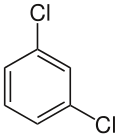1,3-Dichlorobenzene
 | |
| Names | |
|---|---|
| IUPAC name
1,3-Dichlorobenzene | |
| Other names
m-Dichlorobenzene; meta-Dichlorobenzene | |
| Identifiers | |
| 541-73-1 | |
| 3D model (Jmol) | Interactive image |
| ChemSpider | 13857694 |
| ECHA InfoCard | 100.007.994 |
| PubChem | 10943 |
| |
| |
| Properties | |
| C6H4Cl2 | |
| Molar mass | 147.00 g·mol−1 |
| Appearance | Colorless liquid |
| Density | 1.288 g/cm3 |
| Melting point | −22 to −25 °C (−8 to −13 °F; 251 to 248 K) |
| Boiling point | 172 to 173 °C (342 to 343 °F; 445 to 446 K) |
| Insoluble | |
| Hazards | |
| Flash point | 65 °C (149 °F; 338 K) |
| Except where otherwise noted, data are given for materials in their standard state (at 25 °C [77 °F], 100 kPa). | |
| Infobox references | |
1,3-Dichlorobenzene is an organic compound with the formula C6H4Cl2. It is the least common of the three isomers of dichlorobenzene, it is a colorless liquid that is insoluble in water. It is produced as a minor byproduct of the chlorination of benzene, but can also be prepared in a directed manner by the Sandmeyer reaction of 3-chloroaniline. It also arises from the isomerization of the other dichlorobenzenes at high temperature.[1]
References
- ↑ U. Beck, E. Löser "Chlorinated Benzenes and other Nucleus-Chlorinated Aromatic Hydrocarbons" in Ullmann's Encyclopedia of Industrial Chemistry, 2012, Wiley-VCH, Weinheim. doi:10.1002/14356007.o06_o03
This article is issued from Wikipedia - version of the 5/6/2016. The text is available under the Creative Commons Attribution/Share Alike but additional terms may apply for the media files.